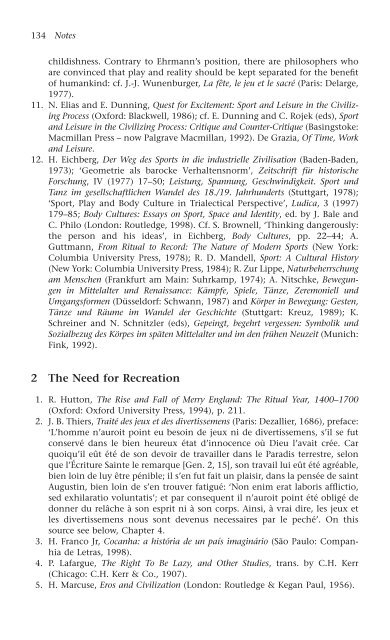Recreation in the Renaissance
Recreation in the Renaissance
Recreation in the Renaissance
- No tags were found...
Create successful ePaper yourself
Turn your PDF publications into a flip-book with our unique Google optimized e-Paper software.
134 Notes<br />
childishness. Contrary to Ehrmann’s position, <strong>the</strong>re are philosophers who<br />
are conv<strong>in</strong>ced that play and reality should be kept separated for <strong>the</strong> benefit<br />
of humank<strong>in</strong>d: cf. J.-J. Wunenburger, La fête, le jeu et le sacré (Paris: Delarge,<br />
1977).<br />
11. N. Elias and E. Dunn<strong>in</strong>g, Quest for Excitement: Sport and Leisure <strong>in</strong> <strong>the</strong> Civiliz<strong>in</strong>g<br />
Process (Oxford: Blackwell, 1986); cf. E. Dunn<strong>in</strong>g and C. Rojek (eds), Sport<br />
and Leisure <strong>in</strong> <strong>the</strong> Civiliz<strong>in</strong>g Process: Critique and Counter-Critique (Bas<strong>in</strong>gstoke:<br />
Macmillan Press – now Palgrave Macmillan, 1992). De Grazia, Of Time, Work<br />
and Leisure.<br />
12. H. Eichberg, Der Weg des Sports <strong>in</strong> die <strong>in</strong>dustrielle Zivilisation (Baden-Baden,<br />
1973); ‘Geometrie als barocke Verhaltensnorm’, Zeitschrift für historische<br />
Forschung, IV (1977) 17–50; Leistung, Spannung, Geschw<strong>in</strong>digkeit. Sport und<br />
Tanz im gesellschaftlichen Wandel des 18./19. Jahrhunderts (Stuttgart, 1978);<br />
‘Sport, Play and Body Culture <strong>in</strong> Trialectical Perspective’, Ludica, 3 (1997)<br />
179–85; Body Cultures: Essays on Sport, Space and Identity, ed. by J. Bale and<br />
C. Philo (London: Routledge, 1998). Cf. S. Brownell, ‘Th<strong>in</strong>k<strong>in</strong>g dangerously:<br />
<strong>the</strong> person and his ideas’, <strong>in</strong> Eichberg, Body Cultures, pp. 22–44; A.<br />
Guttmann, From Ritual to Record: The Nature of Modern Sports (New York:<br />
Columbia University Press, 1978); R. D. Mandell, Sport: A Cultural History<br />
(New York: Columbia University Press, 1984); R. Zur Lippe, Naturbeherrschung<br />
am Menschen (Frankfurt am Ma<strong>in</strong>: Suhrkamp, 1974); A. Nitschke, Bewegungen<br />
<strong>in</strong> Mittelalter und <strong>Renaissance</strong>: Kämpfe, Spiele, Tänze, Zeremoniell und<br />
Umgangsformen (Düsseldorf: Schwann, 1987) and Körper <strong>in</strong> Bewegung: Gesten,<br />
Tänze und Räume im Wandel der Geschichte (Stuttgart: Kreuz, 1989); K.<br />
Schre<strong>in</strong>er and N. Schnitzler (eds), Gepe<strong>in</strong>gt, begehrt vergessen: Symbolik und<br />
Sozialbezug des Körpes im späten Mittelalter und im den frühen Neuzeit (Munich:<br />
F<strong>in</strong>k, 1992).<br />
2 The Need for <strong>Recreation</strong><br />
1. R. Hutton, The Rise and Fall of Merry England: The Ritual Year, 1400–1700<br />
(Oxford: Oxford University Press, 1994), p. 211.<br />
2. J. B. Thiers, Traité des jeux et des divertissemens (Paris: Dezallier, 1686), preface:<br />
‘L’homme n’auroit po<strong>in</strong>t eu beso<strong>in</strong> de jeux ni de divertissemens, s’il se fut<br />
conservé dans le bien heureux état d’<strong>in</strong>nocence où Dieu l’avait crée. Car<br />
quoiqu’il eût été de son devoir de travailler dans le Paradis terrestre, selon<br />
que l’Écriture Sa<strong>in</strong>te le remarque [Gen. 2, 15], son travail lui eût été agréable,<br />
bien lo<strong>in</strong> de luy être pénible; il s’en fut fait un plaisir, dans la pensée de sa<strong>in</strong>t<br />
August<strong>in</strong>, bien lo<strong>in</strong> de s’en trouver fatigué: ‘Non enim erat laboris afflictio,<br />
sed exhilaratio voluntatis’; et par consequent il n’auroit po<strong>in</strong>t été obligé de<br />
donner du relâche à son esprit ni à son corps. A<strong>in</strong>si, à vrai dire, les jeux et<br />
les divertissemens nous sont devenus necessaires par le peché’. On this<br />
source see below, Chapter 4.<br />
3. H. Franco Jr, Cocanha: a história de un país imag<strong>in</strong>ário (São Paulo: Companhia<br />
de Letras, 1998).<br />
4. P. Lafargue, The Right To Be Lazy, and O<strong>the</strong>r Studies, trans. by C.H. Kerr<br />
(Chicago: C.H. Kerr & Co., 1907).<br />
5. H. Marcuse, Eros and Civilization (London: Routledge & Kegan Paul, 1956).










